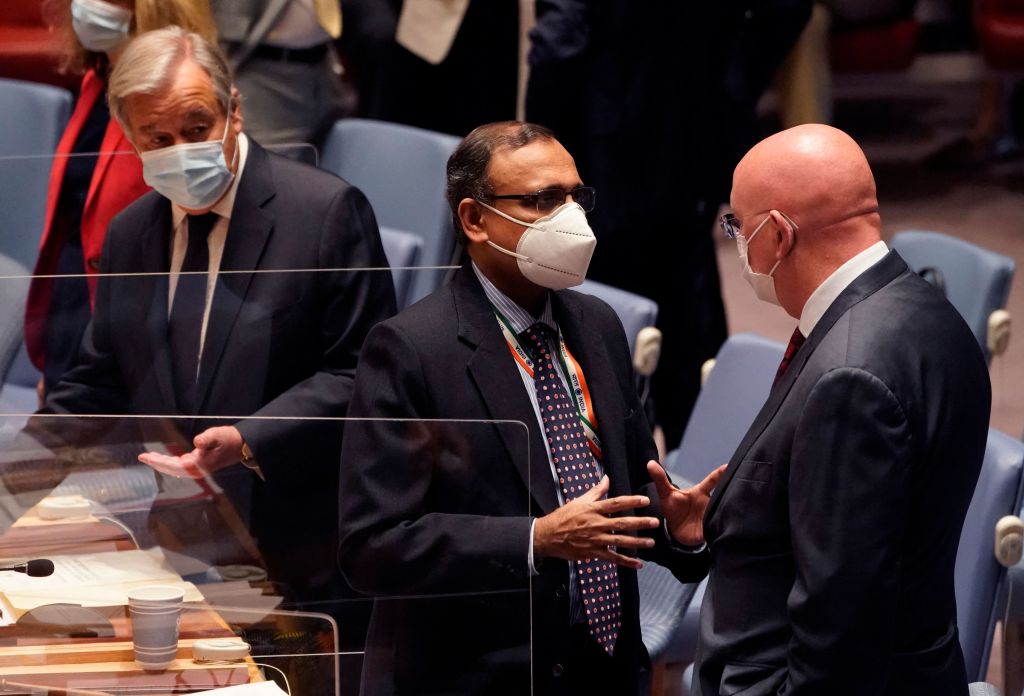- Saturday, January 04, 2025

By: Shubham Ghosh
INDIA’S month-long presidency of the United Nations Security Council for the month of August has come to end with “substantive” outcomes on important global issues, including a strong resolution on the situation in Afghanistan where the situation has worsened in the wake of the Taliban’s return to power.
The resolution, which demanded that the Afghan territory should not be used to threaten any country or shelter terrorists, reflected New Delhi’s views and concerns.
India, which is currently serving a two-year term as a non-permanent member of the 15-member security council, assumed the body’s rotating council for August, the same month when the Taliban recaptured power in Kabul as the US-led western troops exited the country after an occupation that lasted almost two decades.
ALSO READ: Modi speaks on 5 principles on maritime security at UN Security Council
India thanked its colleagues at the council saying their support made its presidency a success with “many substantive outcomes”.
TS Tirumurti, India’s permanent representative to the UN, tweeted on Tuesday (31), the final day of the presidency, saying, “As we wind down our Presidency of UN #SecurityCouncil, we thank all colleagues in #UNSC for their tremendous support to make our Presidency a success with many substantive outcomes.”
“I & @IndiaUNNewYork wish incoming Presidency @irishmissionun & Amb Geraldine Nason all success,” he said.
US Ambassador to the UN Linda Thomas-Greenfield congratulated India for a successful presidency of the UN Security Council for the month of August. “Your leadership and resilience saw us through many challenging issues — especially the situation in Afghanistan,” she said.
“Thanks to @IndiaUNNewYork for a successful presidency during August. Highlights included: meeting on maritime security chaired by PM @narendramodi; and focus on peacekeeping & technology, and on counter-terrorism. Which can only mean 1 thing… we’re up next!” Ireland’s mission to the UN said.
“Brazil extends its warm congratulations to the whole team of @IndiaUNNewYork – our partner in BRICS and IBSA– for presiding over the @UN Security Council in a specially critical month. As an incoming Council member, we look forward to working together next year,” Brazil’s Mission to the UN said.
The Switzerland Mission at the UN thanked “@ambtstirumurti for today’s wrap up of a successful #UNSC presidency. This month underscored the need to Respect #HumanRights & #IHL in Afghanistan, Improve measures to protect #peacekeepers, Strengthen int’l response to humanitarian crises.”
Foreign secretary Harsh Vardhan Shringla, under whose chairmanship the resolution on Afghanistan was adopted, said on Monday (30), “I was in particular very happy to preside over the adoption of today’s important resolution on Afghanistan, which has unequivocally conveyed that Afghanistan’s territory should not be used to threaten or attack any country or to shelter, train terrorists or plan or finance terrorist acts.
It underlines terrorist individuals and entities designated by UN Security Council (resolution) 1267. This is of direct importance to India,” he added.
Under India’s presidency, the council held three sessions on Afghanistan and issued three press statements on August 3, 16 and 27, the last of which strongly condemned the “deplorable attacks” near the Hamid Karzai International Airport in Kabul on August 26 that killed several people.
India began its presidency with a high-level signature event on maritime security presided over by prime minister Narendra Modi, with Tirumurti describing it as “path-breaking” in many ways since this was the first time an Indian prime minister chaired the Security Council.
There was also a presidential statement on maritime security which incidentally was also the first presidential statement on the concept.
“The presidential statement deals with important issues relating to Maritime Security, including the place of UNCLOS (United Nations Convention on the Law of the Sea) in Maritime Security, freedom of navigation, terrorism, especially at sea like Mumbai attacks, trafficking in arms, drugs and humans, the place of regional and sub-regional organisations in this context, piracy,” Tirumurti said.
India’s external affairs minister S Jaishankar chaired two other signature events – on peacekeeping and technology on August 18 and the briefing on ISIL/Da’esh on August 19.
Tirumurti had underlined that the event on peacekeeping showcased India’s strong commitment to peacekeeping, besides reflecting “our age-old tradition” in this field.
India exchanged an MoU with the UN in support of the ‘Partnership for Technology in Peacekeeping’ initiative and to UN C4ISR Academy.
Highlighting the several “historic firsts” that India achieved through this event as well, Tirumurti said for the first time, India drafted a resolution on peacekeeping focused on ensuring accountability for crimes against peacekeepers.
The resolution was sponsored by 80 member states, including all 15 members of the Security Council, “which is not often seen in the Security Council,” Tirumurti added.
“Also for the first time, the Security Council held an Open Debate focused exclusively on how technology can aid in peacekeeping and for the first time, the Security Council adopted a Presidential Statement on the topic of technology and peacekeeping,” he said.
Under India’s presidency, the Council also successfully steered the discussions on various peace and security issues that are on its agenda, including Myanmar, Syria, Yemen and the Middle East peace process.